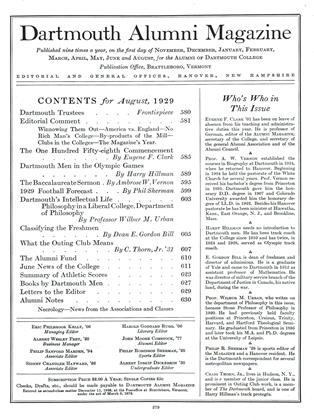It is generally recognized that no student can fruitfully continue the study of philosophy without understanding the foundations of present-day thought in the history of the past. Courses in Ancient and Mediaeval and in Modern philosophy (Phil. 11, 12) bring the student abreast with his intellectual heritage. These courses are required of all who major in philosophy, but more and more the better students of all cultural subj ects are finding them indispensable elements in their general education.
The next step in a philosophical education is a more intensive acquaintance with the philosophical thought of the immediate present. Two courses (Philosophy 13-14) take the student into the very heart of current scientific and philosophical controversy. Any one who works through these courses should emerge with some working philosophy of life. He may be a realist or an idealist, a pragmatist or an absolutist, but he would be a poor student indeed who could not give reasons for the faith that is in him. These courses, moreover, should have the result of preparing the student for any graduate work in philosophy he might undertake or make it possible for him to read intelligently any philosophical literature of the present time.
 View Full Issue
View Full Issue
More From This Issue
-
 Class Notes
Class NotesCLASS OF 1879
August 1929 By Henry Melville -
 Article
ArticleAlumni Council Meetings
August 1929 -
 Article
ArticleThe One Hundred Fifty-Eighth Commencement
August 1929 By Eugene F. Clark -
 Class Notes
Class NotesCLASS OF 1899
August 1929 By Warren C. Kendall -
 Class Notes
Class NotesCLASS OF 1903
August 1929 By John Crowell -
 Class Notes
Class NotesCLASS OF 1918
August 1929 By Frederick W. Cassebeer








